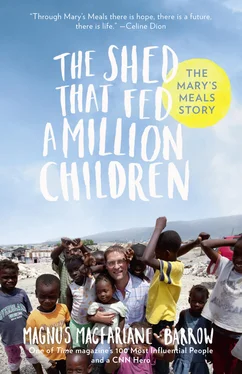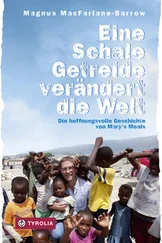This was the fifth trip I had made to Bosnia-Herzegovina in quick succession, and on each previous one I had been accompanied by a different family member or friend. Each had been a precipitous learning curve for a twenty-five-year-old fish farmer who had not ever aspired to be a long-distance truck driver. I discovered a whole world with its own culture, inhabited by long-distance drivers, one which was not always welcoming or easy to understand. Language itself was a problem. There were new technical terms to learn such as the ‘tachograph’ (the device which records the driver’s hours and speed at the wheel) or ‘spedition’ (the agents who prepare necessary customs papers at border crossings). This was made all the harder by our lack of European languages and our Scottish accents. On one of my early trips my co-driver was Robert Cassidy, a good friend from Glasgow, whose accent therefore was stronger than my own one from Argyll. We were driving a 7.5 tonne truck full of donated Scottish potatoes to Zagreb. It was midwinter and bitterly cold. We slept in the back of the truck at night between the pallets of potatoes, and we woke one morning near the Austrian–Slovenian border to find that our large bottles of drinking water had frozen solid, while a sign at the petrol station told us it was six degrees below freezing. One of the new technical terms we were about to learn on this trip was ‘plomb’. This refers to the small seal made of lead, which the customs officials place on the back of a truck when you enter their country, so that when you exit you can prove you transited their territory without opening the trailer and depositing goods. But we didn’t know yet what this term meant and with growing irritation a customs inspector barked a one-word question through his glass window at us. ‘Plomb?’ He wanted to know if our truck was sealed. After answering this repeated question with a blank stare several times, Robert finally answered in his finest Glaswegian accent. ‘Nae plums, just tatties. Loads of tatties.’ This time it was the turn of the customs officer to answer with a bemused stare. He didn’t even know what language to reply to us in.
At this time some of the bridges on the main Adriatic coastal route that took us towards our routes into central Bosnia-Herzegovina had been destroyed by shells, and so to travel that way involved taking a small ferry to Pag (a long, narrow island running parallel to the coast), driving its length and getting a ferry back on to the mainland further south. On one occasion Ken, my brother-in-law and co-driver on this particular trip, and I joined a queue of hundreds of trucks waiting for a small makeshift ferry, on a road that certainly hadn’t been designed for large vehicles, just as an incredibly ferocious storm blew up. The ferries stopped sailing and, like all the other drivers, we found ourselves trapped in our cabs while a freezing wind blasted our truck, rocking it back and forth so violently it felt like we would be blown over. There was no way to turn a truck on that narrow road and so we all had no option but to wait for the storm to blow over. The only food we had in the cab was a large box of Twix chocolate bars, which we carefully eked out over the next forty-eight hours. A couple of times, to meet the call of nature, we fought with the door to climb outside and found ourselves slipping on a frozen stream of truck drivers’ urine that ran from the top of the hill to the little jetty at the bottom of the winding road. I made a mental note to carry a more varied, nutritious stock of emergency food supplies in future – or at the very least a greater variety of chocolate bars.
I also began to learn, on these early trips, that the donations of aid in the back of our truck were not always the most important things we brought to those in desperate need. My father and I once delivered aid to a little institution for children with special needs near the port of Zadar. At this time the Serb forces were attacking that part of the Croatian coast and we could hear the rumble of shells in the distance as we arrived outside the shabby little building. We found rows of children confined to cots, dressed in ragged pyjamas, and some terrified staff trying to care for them. Not only were they stressed about no longer having even the most basic supplies for the children, but the war was getting closer and they knew that to flee quickly and suddenly with these children would not be possible. As we unloaded our boxes of aid from the back of our truck, the staff’s delight soon evaporated as a shell exploded much closer to the village. And then another. They urged us to unload as quickly as possible and to get back on the road north immediately. As soon as I passed the last box from the back of the truck I said my goodbyes, jumped into the driver’s seat and revved the engine ready to go. A few seconds went by and I became annoyed that Dad hadn’t climbed into the seat beside me. When I looked in my rear-view mirror, I saw him hugging the most distraught nurse and giving her words of comfort and a promise of prayers. Only then did he climb in and we sped off. Thirty years later, when I heard Pope Francis use the term ‘sin of efficiency’ for the first time, I thought immediately of this incident. The Pope was reminding those of us who work with people in poverty, that real charity is not just about material goods or ‘projects’ and their ‘effectiveness’. It should also be about looking people in the eye, spending time with them and recognizing them as brothers or sisters. But even today I am not sure whether Dad’s hug had to take quite that long!
On each of those drives across Europe, as we came closer to our usual destination, Medjugorje, we would invariably see all sorts of other vehicles heading for that same world-renowned place of pilgrimage. Little convoys of small trucks like ours, solitary vans or family cars pulling trailers piled high with clothes, food and medicine, all converged on that little village in the mountains of Bosnia-Herzegovina. Flags, car stickers or home-made signs proclaimed their mission and their homeland, and gave clues to their destination. While we loved the opportunity to return to Medjugorje, given that our lives had been changed there many years earlier, we started to consider whether we should also begin taking our aid to other overlooked places, where less help was arriving but where even greater numbers of refugees were suffering.
One such place was Zagreb, the capital of Croatia, where thousands of desperate people were arriving from areas that were being ‘ethnically cleansed’ by the Serbs. At this stage nearly a third of a newly independent Croatia was under Serbian control, and war raged along all of the front lines of a country fighting desperately for its existence. Refugees and displaced people, Croats and Muslims from both Croatia and Bosnia-Herzegovina, were pouring into the city having lost their homes, their possessions, and often their families. Living in Zagreb was a remarkable man called Dr Marijo Živković. A mutual friend from Glasgow had suggested we meet. He had explained to us that Marijo was doing wonderful work for refugees and poor people, and also mentioned that he was a well-known and outspoken Catholic who had been persecuted by the communist regime for that reason. We arranged to meet him at the office of a Muslim organization called Merhamet with whom we were working to distribute medical aid. We had earlier that day arrived with an anaesthetic machine they had urgently requested and had spent the morning with a passionate young doctor and his Merhamet colleagues, learning more about their work and how we might help further. We were a little nervous about the meeting with Dr Marijo because, tragically, the Croats (mainly Catholic) and Muslims, who had until recently been allies in Bosnia-Herzegovina while fighting their common enemy, the Serbs, were now at war with each other, and a burning hatred was now raging between these two peoples. How stupid and thoughtless had we been to have invited a well-known Catholic Croat to come and meet with us while we were with our Muslim friends? We sensed that our hosts were also a little apprehensive and an awkward silence had taken hold of the hot stuffy room by the time Marijo finally arrived. Tall and broad-shouldered, he burst in cradling a huge pile of frozen chocolate bars.
Читать дальше












